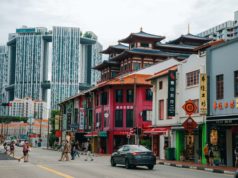(These are some of the milk-based products produced and marketed by the Milka Krem plant and outlet of the Philippine Carabao Center in the Science City of Muñoz. Photo by Elmo Roque)
(Last of 4-Part series)
SCIENCE CITY OF MUÑOZ – For the byproducts of the carabao, like the horn, bone and hide, many entities and individuals are cashing-in by businessing these body parts considered by many as already non-essentials.
For the horns, bones and hides, two establishments in Metro Manila and Bulacan are making high fashion designs and novelty items out of them like leather goods, earrings, combs, necklaces, pendants, and others.
In Barangay Larion Alto in Tuguegarao City, many experts are producing handles for bolos and knives out of the carabao’s horn. They are particularly the blacksmiths who see to it that the handles for the implements they make are fitted with handles from carabao’s horns sourced come from Cagayan and Isabela provinces.
But, of course, the carabao’s meat is a delicacy.
Gourmand’s delight For years, the carabao’s meat has become the food delight not only of rural farming families but also of other sectors of society. In the first place, this is because the meat of the carabao is cheaper than the cow’s, and is therefore very affordable for many consumers.
But more than that, the public has become aware that the carabao’s meat is a health food as it is safe to eat even by people with heart problems and those allergic to red meat. It has less calories, fat and cholesterol compared to most meat, including poultry.
Compared to the popular cow’s meat, it is 12 percent less in fat, 55 percent in calories, and 40 percent in cholesterol. It is also better in protein and minerals and considered nutrient dense which characteristic prevents it from shrinkage during cooking.
The penchant for carabao’s meat by food gourmands, and even those who are just simply looking for good food, has opened up opportunities for big business enterprises. Its skin, no less, has also become a source of a multi-million-peso business.
Two of these carabao’s meat and skin or hide food are Pigar-Pigar and Chica-rabao. Pigar-Pigar is Dagupan City’s version of stir-fried beef. It is made out of thin slices of carabao’s meat which is deep fried and cooked with cauliflower, onion, and broccoli. The name means “turning over” in the Pangasinan dialect.
Chica-rabao is a product of the Lighthouse Cooperative of the Victory Christian Fellowship in Tuguegarao City. Aside from this product, the coop also produces carabeef tapa, carabeef longganisa, and the “Carne Ybanag” in can.
But it’s the chica-rabao that provides big business.
“Our sales for chicha-rabao” run to millions of pesos a year,” the coop’s general manager said.
Carabao meat sausages
The PCC branch station in Los Baños, Laguna is producing and selling 13 variants of sausages processed out of carabao meat. They carried such names as schublig, beerwurst, knockwurst, Italian sweet, Italian hot, mortadella, salametti, summer, kielbasa, kabanosy, breakfast, cocktail, and Hungarian.
For other food delights out of carabao meat, the Maranao’s favorites are randang-sa-ranao, “balbakwa, and pisawawan a carni. The others are bulchachong which is Davao City’s exquisite delicacy similar to the Filipino beef and bone marrow stew called bulalo but is diff erent in appearance, aroma and taste.
The pakdol in Tacloban City is buffalo meat stew of shank with bone marrow, and Chinese cabbage spiced up by ginger and lemon grass; and in Loboc, Bohol, there are three gustatory delights in the sabaw ng kabaw, kilawing kalabaw, and adobong kalabaw.
Incidentally, it was reported that President Duterte’s favorite in Davao City is the tapang kabaw kalabaw. At Sana’s in the Boulevard area, while he was still a prosecutor, he usually relished this tapa which is “dry and with shredded variation taken with smears of briny fish guinamos and casual calamansi squirts”.
Other favorites are pindang damulag and tapang kalabaw in the cities of San Fernando and Angeles in Pampanga, pindang kalabaw in Mangaldan, Pangasinan; lechong kalabaw in Ilagan, Isabela; and carabeef tocino in the City of San Fernando, Quezon City, Baguio City and Cabanatuan City produced by a husband and wife entrepreneur from Pampanga.
Incidentally, there are two eateries in Davao City whose names and slogan carry “carabao” in them. They are the “Blue Carabao Diner” and the “Blue Carabao Eatery”. They both carry the slogan “Taste the Power of the Carabao”. Such taste of the “carabao’s power” is exemplified by their offering of hinalang or halang-halang with chunks of carabao’s meat, made powerful by various spices, which, when taken, the chunks “practically melt in the mouth”.
At the production plant of the Nueva Ecija Federation of Dairy Carabao Cooperative in Talavera town, a milk concoction called “kafir” is being produced. It is described as an acidified milk drink made by mixing kefir grains, cultured grains, and lactic acid bacteria.
The “kefir” originated in the mountain areas in the Caucasus through the practice of herd-keepers of keeping the animal’s milk in leather pouches. It is said that the drinking of kefir whey helps boost the immune system of the body.
Organic milk business
In Bacolod City, a young businessman, Ramon Uy, has succeeded in marketing products that use organic milk. His artisan cheeses, buffalo mozaar and white cheese, are gourmets’ delight in his Fresh Starts Organics Store at the Robinson’s Central Citywalk and some outlets in the Negros Occidental area.
The cheeses are used, along with other organic products, for the preparation of delectable sandwiches.
“The center director of PCC in La Carlota, Negros Occidental introduced me to the possibility of including organic carabao’s milk in my array of organic commodities offered to the public. I immediately asked our chemists and researchers to study and develop it into the products that we now off er. The products are certainly accredited by our accrediting bodies as organic products,” Uy said.
Elsewhere in the country, there are many other entrepreneurs making big money in businessing the carabao.





